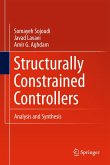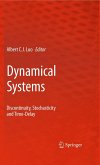This book presents a number of techniques for robustness analysis of uncertain systems. The theoretical basis for their development is derived from the application of convex optimization tools to problems involving positivity of homogeneous polynomial forms. Usually, stability and performance analysis of dynamic systems affected by structured uncertainties, requires the solution of non-convex optimization problems. Constructing a family of convex relaxations, namely convex optimisations, can provide upper or lower bound to the original problem. In this book convex relaxations for several robustness problems are derived by exploiting and providing new results on the theory of homogeneous polynomial forms. A framework is introduced for dealing with positivity of homogeneous forms via the solution of linear matrix inequalities, with examples including Lyapunov analysis of uncertain systems, computation of the parametric robust stability margin, and robust performance analysis for polytopic systems.
It is well known that a large number of problems relevant to the control ?eld can be formulatedas optimizationproblems. For long time, the classical approachhas been to look for a closed form solution to the speci?c optimizationproblems at hand. The last decade has seen a noticeable shift in the meaning of closed form solution. The formidable increase of computationalpower has dramatically changed the fe- ing of theoreticians as well as of practitioners about what is meant by tractable and untractableproblems. A main issue regardsconvexity. From a theoretical viewpoint, there has been a large amount of work in the directions of convexifying nonc- vex problems and studying structural features of convex problems. On the other hand, extremely powerful algorithmsfor the solution of convexproblemshave been devised in the last two decades. Clearly, the fact that a wide variety of engine- ing problems can be formulated as convex problems has strongly motivated efforts in this direction.The control ?eld is not an exception in this sense: many pr- lems in robust control, identi?cation and nonlinear control have been recognized as convex problems. Moreover, convex relaxations of nonconvex problems have been intensively investigated, as they provide an effective tool for bounding the optimal solution of the original problem. As far as robust control is concerned, it is known since long time that several classes of problemscan be reducedto testing positivity of suitable polynomials.
Hinweis: Dieser Artikel kann nur an eine deutsche Lieferadresse ausgeliefert werden.
It is well known that a large number of problems relevant to the control ?eld can be formulatedas optimizationproblems. For long time, the classical approachhas been to look for a closed form solution to the speci?c optimizationproblems at hand. The last decade has seen a noticeable shift in the meaning of closed form solution. The formidable increase of computationalpower has dramatically changed the fe- ing of theoreticians as well as of practitioners about what is meant by tractable and untractableproblems. A main issue regardsconvexity. From a theoretical viewpoint, there has been a large amount of work in the directions of convexifying nonc- vex problems and studying structural features of convex problems. On the other hand, extremely powerful algorithmsfor the solution of convexproblemshave been devised in the last two decades. Clearly, the fact that a wide variety of engine- ing problems can be formulated as convex problems has strongly motivated efforts in this direction.The control ?eld is not an exception in this sense: many pr- lems in robust control, identi?cation and nonlinear control have been recognized as convex problems. Moreover, convex relaxations of nonconvex problems have been intensively investigated, as they provide an effective tool for bounding the optimal solution of the original problem. As far as robust control is concerned, it is known since long time that several classes of problemscan be reducedto testing positivity of suitable polynomials.
Hinweis: Dieser Artikel kann nur an eine deutsche Lieferadresse ausgeliefert werden.
From the reviews:
"The book describes convex optimization techniques to deal with stability and performance evaluation for linear dynamical systems subject to parametric uncertainty. ... In summary, the book is a welcome and timely addition to the technical literature, written by leading experts in the field. It is aimed at systems and control researchers willing to explore further than mainstream LMI Lyapunov analysis techniques, with the possibility of trading off between conservatism and computational burden." (Didier Henrion, Mathematical Reviews, Issue 2010 g)
"The book describes convex optimization techniques to deal with stability and performance evaluation for linear dynamical systems subject to parametric uncertainty. ... In summary, the book is a welcome and timely addition to the technical literature, written by leading experts in the field. It is aimed at systems and control researchers willing to explore further than mainstream LMI Lyapunov analysis techniques, with the possibility of trading off between conservatism and computational burden." (Didier Henrion, Mathematical Reviews, Issue 2010 g)








